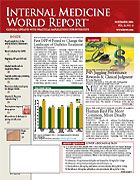Publication
Article
Internal Medicine World Report
Racially Charged HIV Myth Debunked
Author(s):
From the International AIDS Conference Data Show Africans Adhere to Drug Regimens Better than Americans
TORONTO—A meta-analysis has revealed that the rate of adherence to antiretroviral drug regimens is much higher in Africa than in North America, taking away at least part of the argument for delaying expansion of anti-HIV programs in resource-poor settings. Data presented at the XVI International AIDS Conference (and also published in JAMA. 2006; 296: 679-690) show that the pooled estimate of adherence is 55% in studies of North Americans and 77% in studies of Africans.
“The main point is there are many settings in Africa where adherence is at a high level. This makes it very difficult for policymakers to issue blanket statements which suggest that adherence necessarily has to be bad because it’s in Africa,” commented Richard Glazier, MD, senior scientist, Institute for Clinical Evaluative Sciences, and scientist, Centre for Research on Inner City Health, St. Michael’s Hospital, Toronto, Ontario.
Edward Mills, PhD, MSc, director, Centre for International Health and Human Rights Studies, Toronto, and his coinvestigators combed the English literature for prospective studies that used adherence rates as a primary or secondary outcome. The studies also had to meet other rigorous criteria, such as including general rather than narrowly defined populations of HIV-positive patients.
A total of 28 full-text articles and 3 abstracts of North American studies and 9 full-text articles and 18 abstracts of African studies met the inclusion criteria.
Analysis demonstrated a significantly higher rate of adherence in the African studies, with a pooled estimate of 77% compared with 55% for the North American studies (P <.001). When only full-text articles were included, the results were similar, with pooled estimates of adherence rates of 71% for Africans and of 57% for North Americans.
Overall, Africans were 2.5 times as likely to adhere to antiretroviral therapy as North Americans. The differences were not affected by access to free care.
“Our findings suggest that concerns about suboptimal adherence in Africa are not supported by the data, and such concerns should not contribute to delayed access to treatment,” concluded Dr Mills. He noted, however, that this study did not attempt to control for such variables as disease stage, disease duration, or regimens used. Thus, North American studies in which patients took 22 pills at several different times each day were treated on an equal footing with African studies in which patients took 1 pill twice a day.
“But, proportionally, the studies from both continents relied similarly on patient recall and pill counts to evaluate adherence,” he said. “This makes our analysis as valid as the data upon which policies are created regarding provision of care in North America.”






